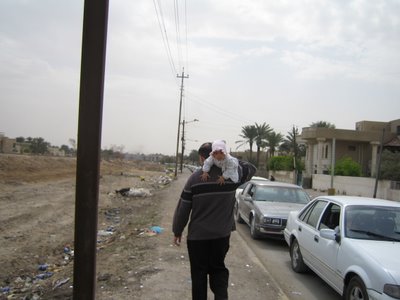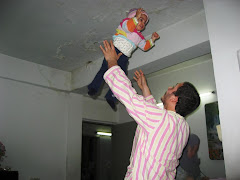
Above is a picture we took of my daughter in the dark (a few months ago), when the electricity was cut off. She opens her eyes really wide, as though she might be able to see better this way. Electricity cutting off is a daily fact of Iraqi life. I don't mean that it cuts off for a few hours a day, but rather that it comes on a few hours a day. This winter, we've been having electricity on a rough schedule of 1 hour every six hours. When it got really good this past week, it would come on 3 hours and cut off for three hours, all day long.
Before Saddam's ousting, Baghdad residents had electricity all day long, except for the 1-2 hours when it was cut off. But, other Iraqi provinces were not so lucky, with less than five hours of electricity a day. So supposedly, the new government has managed to more evenly distribute electricity across the country. Unfortunately, today, everyone is getting less than five hours of electricity a day, Baghdadis and non-Baghdadis. And since I arrived in Baghdad more than two years ago, the situation has not improved one bit.
On a personal level, you can't really understand what its like to actually live without this basic service until you experience life here. Once, when I couldn't watch TV, or go on the Internet, or wash my laundry, I decided to go iron some clothes that needed ironing. It wasn't until I went up to my ironing table and held the iron in my hands that it clicked in my mind that I couldn't do this either. It just happens that you don't fully realize the situation until you live it.
And then there's the extreme weather here that can only be combatted with full-blown air-conditioners in the summer time, and numerous space heaters in the winter. I usually escape the crazy summers here by travelling to my family in the States. But the one summer that I spent here until the 10th of June, before we had a generator to ease the situation, killed me. It gets crazy hot here in the summers (reaching temps above 140 degrees F in July/Aug), to the point that you really can't do
anything without electricity, least of all sleep. You can't cook, you can't read, you can't concentrate, and you can't rest till the electricity comes back on. Even showers aren't that pleasurable because the water pipes heat up from the sun.
Winter isn't much better, especially with a baby, as I have experienced this past winter. You have to remember that water heaters are electric here, and there is no central heating (winters are pretty cold). So most of the time, my poor baby was bundled up in alot of layers (not something that a moving baby likes) and given baths only once a week. And when I bathed her, I had to wait for a combination of things; she was awake, had not been fed less than half an hour ago, electricity had been on for a bit so I could warm up the room and the bathroom with space heaters. One time when I thought I had everything in place, I ran into the bathroom to turn on the water, but it came out lukewarm. I waited for it to get hotter, but it didn't. The water heater had not been on long enough. So, baby Sumayya couldn't get her bath that day. Yup, it was frustrating.
But this is not a full picture of what the situation is like. Most Iraqis have electric generators, or share an electric generator with neighbors for such times. But since it's expensive, most only have about 5 amperes of electricity to use. That's about enough to light 3-4 neon bulbs, a fan, TV and perhaps the fridge. No heater, a/c, water boiler, iron, blow-dryer, washing machine, etc. In the summers, this means that you can't keep perishables in the fridge, or turn on the a/c, and in the winters, no hot water and people usually depend on kerosene heaters (stinky fumes, not very healthy). And to make matter more difficult, the price of diesel (to run the generators) fluctuates like crazy, at the moment having reached quadruple its normal price. So mostly, people save their generator use for night-time, when they need light.
This is the reality of life for most Iraqis. I'm lucky that we have the ability to co-own a middle-sized generator. This means that when we have our generator on, we can turn on 2-3 space heaters or unit a/c's. We can also turn off one heating/cooling unit and turn on the water boiler or the washing machine. But most of the time, we only turn it on after the sun has set, when we need light. As is the case now, I'm sitting without any electricity and typing away on our laptop, keeping my eyes on the amount of battery I have left. I'm still okay, at 75%, but I can't post this blog until the electricity comes back on in five hours.



